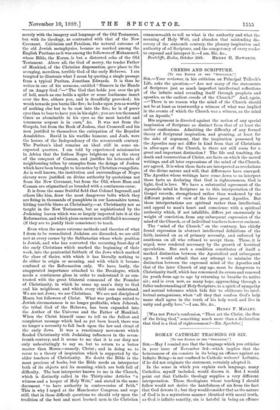CREEDS AND SCRIPTURE.
[To THE EDITOR OP THE "SPECTATOR."] SIR,—Your reviewer, in his criticism on Principal Tulloch's Life, asks the question,—" Are not many of the statements of Scripture just as much imperfect intellectual reflections of the infinite mind revealing itself through prophets and apostles, as the earliest creeds of the Church?" And, again, —" There is no reason why the mind of the Church should not be at least as trustworthy a witness of what was implied in the events of which the Church was a witness, as the mind of an Apostle."
His argument is directed against the notion of any special inspiration of Scripture as distinct from that of at least the earlier confessions. Admitting the difficulty of any formal theory of Scriptural inspiration, and granting, at least for the sake of argument, that the inspiration possessed by the Apostles may not differ in kind from that of Christians in after-ages of the Church, is there not still room for a great and important distinction ? The life and teaching, the death and resurrection of Christ, are facts on which the sacred writings, and all later expressions of the mind of the Church, are agreed. It is when these facts are interpreted as revelations of the divine nature and will, that differences have emerged. The Apostles whose writings have come down to us interpret these facts as declaring that God is righteousness, God is light, God is love. We have a substantial agreement of the Apostolic mind in Scripture as to this interpretation of the Gospel records, strengthened rather than weakened by the different points of view of the three great Apostles. But these interpretations are spiritual rather than intellectual, and appeal to man's heart and conscience with a spiritual authority which, if not infallible, differs yet enormously in weight of conviction, from any subsequent expression of the mind of the Church, or of individual teachers however eminent.
The "mind of the Church," on the contrary, has chiefly found expression in abstract intellectual definitions of the faith, insisted on as of primary necessity, and enforced by anathema on all who refused to accept them. These, it is urged, were rendered necessary by the growth of heretical speculation. But such a condition constitutes of itself a marked distinction between the Apostolical and subsequent ages. I would submit that any attempt to minimise the distinction between the expressed mind of the Apostles and that of the later Church of any age, must be dangerous to Christianity itself, which has renounced its errors and renewed its youth from age to age by returning to breathe its native air ; and is even now, as many hope, approaching through a fuller understanding of Holy Scripture, to a spirit of sympathy- and mutual tolerance which bids fair to obliterate its intel- lectual antagonisms, when "all they that confess God's holy name shall agree in the truth of his holy word, and live in unity and godly love."—I am, Sir, &c.,
HENRY F. MALLET.
[Was not Peter's confession, "Thou art the Christ, the Son of the living God," something much more than a declaration that God is a God of righteousness P—En. Spectator.]






































 Previous page
Previous page